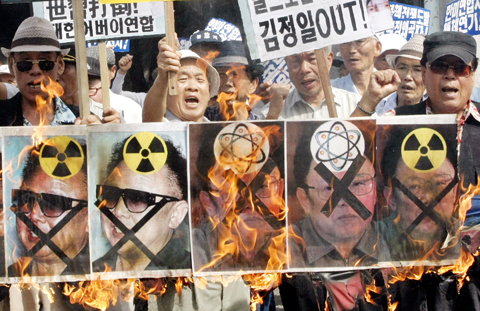North Korea announced yesterday that its process of enriching uranium is nearly complete, giving it a new way to make nuclear bombs as the US and regional powers discuss how to bring Pyongyang back to disarmament talks.
The move raises concerns that North Korea may soon produce uranium-based bombs in addition to those made from plutonium.
The US, China, Japan, Russia and South Korea had been trying for years to persuade North Korea to dismantle its plutonium-based nuclear program, which experts say has yielded enough weaponized plutonium for at least half a dozen bombs, in exchange for much-needed aid.

PHOTO: AP
After hashing out a 2007 disarmament-for-aid deal, North Korea walked away from those talks earlier this year in anger over the rising international outcry over a rocket launch widely condemned as a disguised test of its long-range missile technology.
Uranium can be enriched in relatively inconspicuous, underground factories, and could provide North Korea with an easier way to build nuclear bombs, experts in the US and at South Korea’s Institute of Nuclear Nonproliferation and Control say.
Uranium-based bombs may also work without requiring test explosions, like the two carried out by North Korea in May and in 2006 for plutonium-based weapons.
Washington’s special envoy on North Korea, Stephen Bosworth, said any nuclear development in North Korea was a matter of concern.
“We confirm the necessity to maintain a coordinated position and the need for a complete denuclearization of the Korean Peninsula,” he said in Beijing during an Asian trip to discuss North Korea with counterparts in China, South Korea and Japan.
The US had long suspected that the North also had a covert uranium enrichment program, which would give it a second source of nuclear material. North Korea for years denied the claim but revealed in June that it was prepared to start enriching uranium.
“Experimental uranium enrichment has successfully been conducted to enter into completion phase,” North Korea said in a letter to the UN Security Council carried yesterday by its official Korean Central News Agency.
Verifying North Korea’s claim on uranium enrichment would not be easy, South Korean Defense Ministry spokesman Won Tae-jae said, adding that it could be a negotiating tactic.
However, the announcement suggests the regime has made progress in research and development in its uranium program in a small pilot factory, said Lee Choon-geun of South Korea’s state-funded Science and Technology Policy Institute. Still, he said, it could take at least five years to build a uranium-based bomb.
North Korea also said yesterday it was continuing to weaponize plutonium. The 2007 deal had called for disabling its reactor.
The tough talk indicated North Korea’s impatience with the US as Washington continues to pursue sanctions against the North despite a series of overtures from it in recent weeks.
“We are prepared for both dialogue and sanctions,” the North said in the letter to the Security Council. If some permanent council members “wish to put sanctions first before dialogue, we would respond with bolstering our nuclear deterrence first before we meet them in a dialogue,” it said.

The US government has signed defense cooperation agreements with Japan and the Philippines to boost the deterrence capabilities of countries in the first island chain, a report by the National Security Bureau (NSB) showed. The main countries on the first island chain include the two nations and Taiwan. The bureau is to present the report at a meeting of the legislature’s Foreign Affairs and National Defense Committee tomorrow. The US military has deployed Typhon missile systems to Japan’s Yamaguchi Prefecture and Zambales province in the Philippines during their joint military exercises. It has also installed NMESIS anti-ship systems in Japan’s Okinawa

‘WIN-WIN’: The Philippines, and central and eastern European countries are important potential drone cooperation partners, Minister of Foreign Affairs Lin Chia-lung said Minister of Foreign Affairs Lin Chia-lung (林佳龍) in an interview published yesterday confirmed that there are joint ventures between Taiwan and Poland in the drone industry. Lin made the remark in an exclusive interview with the Chinese-language Liberty Times (the Taipei Times’ sister paper). The government-backed Taiwan Excellence Drone International Business Opportunities Alliance and the Polish Chamber of Unmanned Systems on Wednesday last week signed a memorandum of understanding in Poland to develop a “non-China” supply chain for drones and work together on key technologies. Asked if Taiwan prioritized Poland among central and eastern European countries in drone collaboration, Lin

NO CONFIDENCE MOTION? The premier said that being toppled by the legislature for defending the Constitution would be a democratic badge of honor for him Premier Cho Jung-tai (卓榮泰) yesterday announced that the Cabinet would not countersign the amendments to the local revenue-sharing law passed by the Legislative Yuan last month. Cho said the decision not to countersign the amendments to the Act Governing the Allocation of Government Revenues and Expenditures (財政收支劃分法) was made in accordance with the Constitution. “The decision aims to safeguard our Constitution,” he said. The Constitution stipulates the president shall, in accordance with law, promulgate laws and issue mandates with the countersignature of the head of the Executive Yuan, or with the countersignatures of both the head of the Executive Yuan and ministers or

CABINET APPROVAL: People seeking assisted reproduction must be assessed to determine whether they would be adequate parents, the planned changes say Proposed amendments to the Assisted Reproduction Act (人工生殖法) advanced yesterday by the Executive Yuan would grant married lesbian couples and single women access to legal assisted reproductive services. The proposed revisions are “based on the fundamental principle of respecting women’s reproductive autonomy,” Cabinet spokesperson Michelle Lee (李慧芝) quoted Vice Premier Cheng Li-chiun (鄭麗君), who presided over a Cabinet meeting earlier yesterday, as saying at the briefing. The draft amendment would be submitted to the legislature for review. The Ministry of Health and Welfare, which proposed the amendments, said that experts on children’s rights, gender equality, law and medicine attended cross-disciplinary meetings, adding that